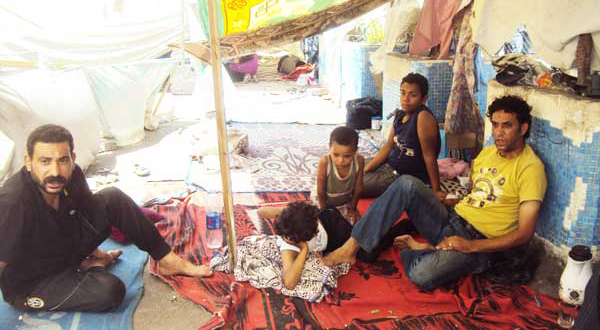 CAIRO: Dozens of protesters holding an open sit-in at the State TV building Maspero demanding affordable government housing denied media reports claiming they met government officials to discuss their demands.
CAIRO: Dozens of protesters holding an open sit-in at the State TV building Maspero demanding affordable government housing denied media reports claiming they met government officials to discuss their demands.
"Security officials told us that we can talk to government officials about our demands only after we end the open sit-in," Mamdouh Khairy, 32, member of the delegation that represents the protesters, told Daily News Egypt.
Central Security Forces cordoned the protesters on Sunday after iftar and briefly closed off the roads, to convince them to move to Maspero's parking lot.
The protesters refused saying that their sit-in wouldn't be effective if it was moved to the parking lot where no one would see them.
"Here [in front of Maspero] our voices are heard and people passing by can see us," Khairy said.
Others speculated that security forces would detain them and beat them if they moved to the parking lot away from the main street.
"They beat us before at the governorate's headquarters and briefly detained some of us in an attempt to blackmail the rest of us to leave," Soheir Abdel Hady, 23, told DNE.
The protesters said that on May 4, military forces beat them with sticks and electric rods, forcing them to end their open sit-in at the governorate's headquarters.
"All we want is four walls, is that too much to ask?" Khairy asked.
Security forces managed to convince the protesters to move their tents from the Corniche to the area in front of Maspero.
Khairy and another member of the delegation, Nasser Ibrahim, 42, said they met several times with government officials including Cairo Governor Adel Qawi Khalifa.
"They gave us empty promises, and months later, we're still on the streets," said Ibrahim.
"These officials would never allow their sons and daughters to live the way we are living on the streets for even one second, let alone months," Khairy said.
The story goes back to the January 25 uprising, when the protesters say they were forcibly evicted from their apartments in Al-Nahda area in Now homeless, dozens who were evicted from their apartments in Madinat Al-Salam in the aftermath of the January uprising, no hold an open sit-in in from of the state TV building Maspero..
"We are victims of the January 25 Revolution," said Khairy.
They said that reports about thugs taking over apartments in the area scared the landlords who decided to take preemptive measures and evict them.
Others couldn’t afford to pay the rent after their daily wages were cut because of the economic slump that followed the revolution.
Most of the protesters are construction workers or microbus drivers whose daily wages were deeply affected by the political turmoil.
In June, six committees conducted field research on the camp’s residents to verify whether they were eligible for government housing, according to Cairo governor Khalifa.
Khalifa said that 126 cases out of 1,033 cases proved eligible for receiving government housing.
However, camp residents claim that only around 10 families received housing, while the other 116 cases included names that they had never heard of.
"Corruption and bribes are still embedded in our government even after the revolution," Khairy said.



